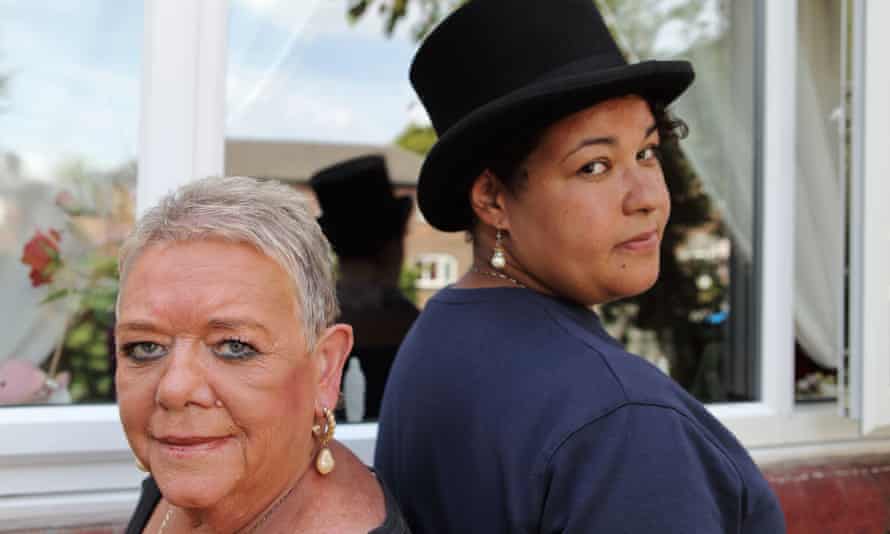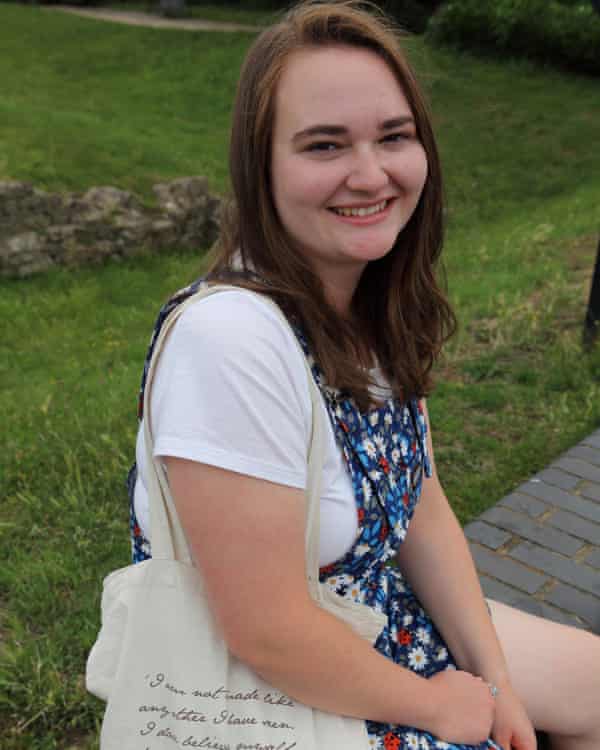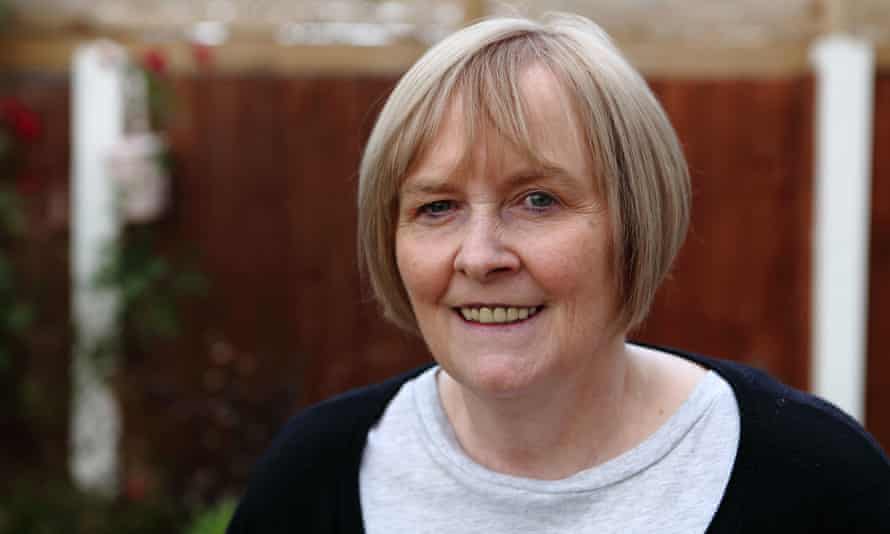What can a 19th-century landowner teach modern British women about their sexuality? Rather a lot, it turns out – especially if that landowner is Anne Lister. The “first modern lesbian”, as she is considered by some, has been an inspirational figure ever since her diaries, detailing affairs with women, were decoded and published in the 1980s. But, thanks to Sally Wainwright’s rollicking period drama Gentleman Jack – in which Lister is played by the inimitable Suranne Jones – word of the Yorkshirewoman’s radical ways has spread like wildfire, upending many women’s lives in the process.
As the show’s second series concludes, a new documentary, Gentleman Jack Changed My Life, is taking a closer look at the show’s most devoted fans. For some, Jones’s depiction of Lister as a remarkably assertive woman has given them the confidence to come out to friends and family members; for others, the show has helped them make sense of their sexuality after years – or decades – of confusion.
Yvonne, who is 64 and from Blackpool, is one of the women whose lives were irrevocably changed by Gentleman Jack when the show debuted in 2019. From the moment she noticed the “woman-on-woman involvement” in the trailer, she says, her “antennae went up. I just thought it was because I like strong women and I love period dramas. So I was like, ‘I’ve got to watch this.’” In the past she had been a fan of The L Word and loved the lesbian historical fiction of Tipping the Velvet author Sarah Waters, but it was only when rewatching a Gentleman Jack scene in which Lister and her partner, Ann Walker, declare their love for each other on a clifftop, that Yvonne began to suspect her fascination with the subject matter might run deeper.
“I thought, ‘You’re getting too interested’ – this questioning came in.” Underneath the YouTube video was a link to another woman’s coming out story. “It could have been my life. It was like a ceiling fell in and I just couldn’t pretend any more. I thought, Oh my God, Anne Lister, I hate you – because she kept drawing me in.”
The documentary follows Yvonne as she comes out to her adult children, whose reaction she describes as “incredible – they took it in their stride, really.” More shocking for them, she says, was the fact that their typically very private mother had taken part in the documentary. Yet although she is nervous about the broadcast – “I have no desire to be on screen, I’m like a rabbit in headlights!” – Yvonne is optimistic that the film will have a positive impact on others. “I hope it helps somebody, and that they don’t have to hate themselves or go through the turmoil this can bring.”
For 35-year-old Sami from Manchester, another of the documentary’s subjects, the idea that Gentleman Jack was a period drama rooted in historical fact made all the difference. “I thought, ‘Wow, she had the guts to do this in that day and age.’ That resonated – just to be me.” Having come out to her mum in her early 20s, the lawyer had subsequently gone back into the closet, leaving her mother believing her daughter’s sexuality was “just a phase”. Not normally one for committing to watching a TV show – “I’m quite hyper, so for me to sit down and watch a full series it would have to be quite good!” – Sami became hooked. Discussions with her mum about her sexuality had been “explosive over the years”, she says, but the show, which they watched together, gave Sami the confidence to assert herself. “It allowed us to start talking about these uncomfortable issues. I don’t think my mum is 100% [onboard], but I feel more able to talk to her about it now, whether she likes it or not.”

Chichi is in her early 20s and had already come out to her mum before Gentleman Jack aired. But the show gave her the impetus to tell her dad, and later her grandparents – an announcement the film chronicles to heartwarming effect. Already aware of Lister’s significance thanks to a Sue Perkins documentary from 2015, and a one-off BBC drama from 2010 – Chichi was eagerly anticipating Wainwright’s version. Despite having watched numerous queer dramas before, it was Gentleman Jack that really changed her perspective on coming out. Whereas other shows tended to be niche – many of them crowdfunded or only available on YouTube – the fact that this show clearly had a broad target audience in mind felt validating: it was “mainstream on the BBC at a peak time on Sunday, which was amazing”. Chichi thinks the period drama element also helped – because nobody lives like Lister any more, her story and the setting have become strangely inclusive, making it “accessible for everyone to relate to in their own way”.
The fact that Gentleman Jack is set in the 1800s felt significant for other reasons, too. Before watching the show, Chichi had been unsure whether to come out to her grandparents. “We were so close and I thought I don’t want to rock the boat,” she says. But the reaction of Lister’s loved ones in the show, despite the intolerant times they lived in, motivated Chichi to be fully transparent. “I loved how the relationship Anne has with her aunt was depicted, because she was always so supportive, and I thought, ‘I really want that.’ If her aunt could be that supportive back then, there is hope.”

Lister’s strength also felt contagious. Seeing that level of self-possession on screen “helped me feel more comfortable with myself and care less about what people think. Anne Lister was so unapologetically herself at a time when everyone was against her – if she could do it back then, I can definitely do it now. She was such a strong person,” says Chichi.
Yvonne agrees that it was the show’s basis in reality – coupled with Lister’s ability to know herself in a world that had “no language” for her desires – that proved most inspirational. “You can’t comprehend that somebody lived that life unashamedly back then. That boggled my mind,” she says. One thing that stood out to Yvonne, who is a Mormon, was the way Lister dealt with the conflict between her attraction to women and her faith. She cites a scene in which Walker worries such desires are “evil”. “Anne Lister stood and said, ‘I am made perfectly in the way God intended me to be, I’m not apologising for that.’ That was what went right through my soul. And I thought, ‘She’s right – whatever’s going on with me, this is how God intended me to be.’”
Gentleman Jack hasn’t just allowed these women to better understand themselves, it’s also helped them make like-minded friends. “If you ask someone if they like Gentleman Jack, you can tell a lot from their reaction,” says Sami. “Are they accepting? So I’ve used that as a tester – that’s worked well.” Yvonne, meanwhile, says the show has opened up a whole new world for her, having met other Gentleman Jack devotees from across the globe at the Anne Lister birthday week, a celebration in Lister’s home town of Halifax.
Yvonne is still reeling from the transformative effect Gentleman Jack has had on her life. “It’s so weird because I was so embarrassed. I was thinking, at my age, this is ridiculous, you should have known this years ago. But it was like a puzzle piece slotting into place. I feel more centred, more me than I’ve ever felt. And it’s taken a programme to jolt it out of me.” Such realisations make for an incredibly heartening documentary, and they are proof that progressive, representational TV remains vital. “I’ve come a long way since the first series,” says Sami. “I just wish it had come along earlier.”

